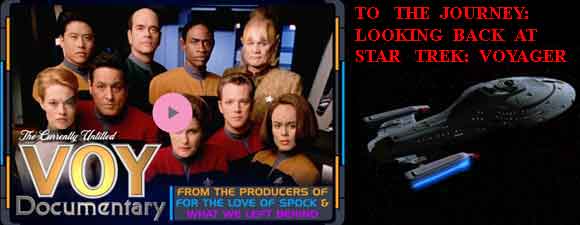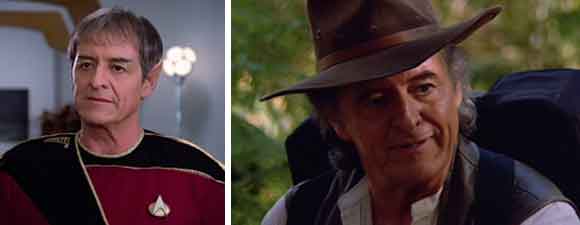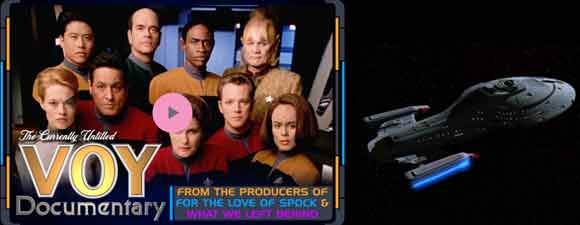Retro Review: The Q and the Grey
9 min read
qandgreybanner
Q demands that Janeway have a child with him to stop the civil war in the Continuum caused by Q(uinn)’s suicide.
Plot Summary: Voyager’s crew is thrilled to witnesses a rare supernova up close. Afterwards, Janeway goes to her quarters, only to find that Q has transformed them into a love nest, where he informs her that he wishes her to be the mother of his child. After dismissing him, Janeway warns the bridge crew to be on the lookout for omnipotent interference. While Chakotay expresses concern that Q is pursuing Janeway with puppies and promises of an immediate trip home, the crew discovers several more supernovas, which Q admits are being caused by a conflict within the Continuum triggered by the suicide of the Q whom Janeway previously determined should have the right to be mortal. When Q’s longtime lover appears to demand that he give up Janeway, Q confesses that he wants to have a child with Janeway not out of love but to bring new blood into the Continuum and end the war. He takes Janeway to the center of the carnage, depicted as the American Civil War so that Janeway can comprehend the extent of the violence. While the female Q tries to help Chakotay and Torres navigate Voyager into the Continuum so the crew can retrieve their captain and the female Q can reunite with her ex-lover, Janeway tries to work out a negotiation with Q’s opponents. She is captured and threatened with execution. The female Q leads Voyager’s crew into battle using Continuum weapons. After they rescue Janeway, Q and his ex agree to procreate together to see whether that changes the Continuum and their opponents agree to a ceasefire. With the universe safe from the warring Q, Voyager’s crew find themselves back on the ship, where Q arrives to show off his baby to “Auntie Kathy.”
Analysis: Among Voyager‘s episodes, “The Q and the Grey” may be my guiltiest pleasure. It has more sex-and-gender problems even than “Threshold” – the other episode in which a powerful male abducts and tries to impregnate the captain. Paris had (d)evolved into a giant salamander and couldn’t be held responsible for his actions, whereas Q, being omnipotent, presumably knows not only how humans court one another in the 24th century, but also what appeals specifically to Janeway, who is briefly swayed by his puppy. Yet “The Q and the Grey” also has that very entertaining characterization of the Q Continuum as the Antebellum South, plus – this is why it’s such a guilty pleasure! – the glorious moment during which Chakotay admits that Q wanting to mate with Janeway really upsets him, at which Q growls that he thinks Chakotay is jealous and Janeway should have told him there was another man. (Q asks whether the attraction is the forehead tattoo, then gives himself more extensive facial art and declares in classic alpha male fashion, “Mine’s bigger!”) I honestly don’t know how anyone can read that scene as Chakotay expressing only concern for a superior officer, not deeper feelings he doesn’t believe he should verbalize, though he doesn’t need to because Janeway already knows and is reaching out to him when Q interrupts. To put a completely positive spin on “The Q and the Grey” – often posited in fan fiction, though not in cast or crew interviews – one must believe that Q doesn’t really want to have a baby with Janeway at all, since humanoid sexual reproduction is kind of icky (he says as much to her later), but he can’t bring himself to admit that what he really wants is her “inferior” human mind, both to help him make the female Q forgive him and to find a way to restore the rest of the Continuum. I’d accept all of Q’s sexism if I thought it was always intended to be parody and if Janeway reacted to it as such.
Because it’s a reasonable test of whether the scriptwriters are being sexist or just writing mediocre dialogue, let’s consider how this story would play out if Kirk or Picard rather than Janeway were Q’s intended co-parent. There’s no reason that couldn’t happen. Q tells Picard in “Qpid” that he could appear to Picard as a woman, and since Q reproduction is largely theoretical, especially with lesser species, I’m not sure why Q doesn’t ask Picard instead of Janeway to have a child with him. They’ve shared more emotional intimacy than Q has with Janeway. Apart from Sisko, none of the captains ever expresses any passionate interest in becoming a parent, and despite a prodigious appetite for the act that produces offspring, Kirk doesn’t know what to do when he finds out he had a son. Would Q woo Kirk or Picard with the equivalent of bathtub serenades, baby animals, roses and chocolate? Possibly. Would Q turn up in their bedrooms? Definitely – in fact, he put himself in Picard’s bed in “Tapestry.” Would Q make the same jokes about committed relationships being equivalent to prison and admit that his devotion would be to his child rather than to his partner? That answer might be different for Kirk than for Picard, since Kirk, like Q, has a wandering eye, while Picard spends decades pining for Beverly Crusher. But would Q characterize a male captain as designed for child-rearing on the basis of anatomy, ponder a male captain’s biological clock, declare that a male captain could make no greater contribution to the universe than producing offspring? Absolutely not. In an episode full of clever inside jokes about Klingon females and the long friendship between Kate Mulgrew and John de Lancie, why does Q fall back on the phrase “playing hard to get” in its privileged male 20th century usage? Why would Q expect Janeway to know it and react to it? To quote Chakotay, this bothers the hell out of me.
I’m glad the writers don’t belabor the sex-as-commerce question – would Janeway sleep with Q if it meant getting back to Earth? – but I also believe that in her situation, stranded in the Delta Quadrant with diminishing resources, Kirk would cheerfully swap sex with Q for a trip home and probably make Q fall in love with him for life in the process. Even centuries in the future, the strongest woman we know gets told that the most important thing she can be is a powerful man’s lover, baby mama, and nursemaid. Q never thanks Janeway for the intelligence and resourcefulness that make possible the end of the war of the gods, and though I’ve always found it forgivable when Q himself behaves in blustering human cliches, which one could argue Q adopts specifically to communicate with Picard and Riker so that when the Borg threat becomes known, they’ll take it seriously, now we see the entire Continuum demystified. Multiple Q behave like Americans from a less enlightened century than our own. The guys are running around with guns like standard boring macho men, while the only Q woman we meet – played by the same actress as the gloriously independent K’Ehleyr, Worf’s onetime mate – adheres to clingy female stereotypes, desperate to recapture her man, eager to have his baby, when she too could be dressed as a soldier fighting the good fight. Either the South is a representation of how Q himself sees the Continuum or it’s a representation of what he thinks Janeway’s crew wants to see…in either case, not a place I’d expect to see Chakotay and Tuvok playfully dressed as Union soldiers. Janeway rises above it, fearless and innovative as she seeks a solution, but then she loses her mind: to prove a point about perseverance, she tells Q he doesn’t have to send her crew home because it’ll mean more if they get there through hard work.
In the end, we’re shown Janeway giving a schoolmarm lecture instead behaving like the relatable, well-rounded human being who reaches out to Chakotay at the moment he seems to be on the verge of the confession we already heard metaphorically once, in “Resolutions” when he promised to stay by her side and do everything he could to make her burden lighter. The thread of that love story made me forgive “The Q and the Grey” for everything, for years, until the writers finally decided they’d never have the guts to see it through and tossed it aside completely in the show’s final season. Janeway tells Q that one day she would like to have a child, but she’s also very clear that she considers a traditional commitment to be a prerequisite. I’m not sure I agree with her that that’s the strongest foundation of a family – love, conscience, and compassion can be found among all sorts of non-nuclear families, whether it’s grandparents as primary caretakers because birth parents can’t take on that role or friends who decide to raise children together – but if those are her values, if that’s what she chooses for herself, then I am in complete agreement that she should have a family on her own terms. If Sisko could do it while the Dominion War is underway, Janeway could do it too, and arguably should do it before she turns into the basket case she becomes in later seasons in episodes like “Night.” Where was Q then to ask whether an alternate dimension might tempt her, since she was determined to deny herself all human contact? It seems fitting that Q’s representation of his own people’s war saddles this captain with skirts to trip over.
Twenty years ago today, I was at the only science fiction convention to which I ever traveled on a plane: Starfest in Denver. I was sharing a hotel room with Madame Manga, who was then the most famous Janeway fan fiction writer on Usenet, back in an era before Geocities, LiveJournal, Tumblr, FF.net, AO3. I met a lot of people at that convention, one of whom was Kate Mulgrew. At the time she was the one I was most excited to meet, and though I interviewed her a few times afterward, it wound up being the only time I saw her face to face. Many of the friends I made at that convention, however, have remained friends for life. I spoke to several of them yesterday both because it was the anniversary of our meeting and because we had just learned of Prince’s passing. Having lost David Bowie and Alan Rickman earlier this year, I’ve spent a lot of time thinking about celebrities and what they mean to us. I was only ever an average fan of Bowie’s music, and though Labyrinth loomed large over my generation, I was, as ever, more thoughtful about the lead female character than the star. It was only as I tried to articulate what Bowie and Prince stood for among people who felt different – often in terms of sexuality, but also in terms of creativity and artistry and how we express those things – that I could explain it wasn’t the musicians I was mourning, but the public figures upon whom so many of us projected our own images. It’s even more true with Rickman, whose acting I admired but whose appearance as Snape brought together many women of my generation in a franchise we’d first encountered while introducing books and movies to our children. I can’t imagine what my life would be like right now, who my friends would be, what professional connections in writing I would have made, without these celebrities. So while I express my frustrations with Janeway, I want to mention my gratitude to Mulgrew. I hope Prince and the others knew how much they were appreciated, too.






